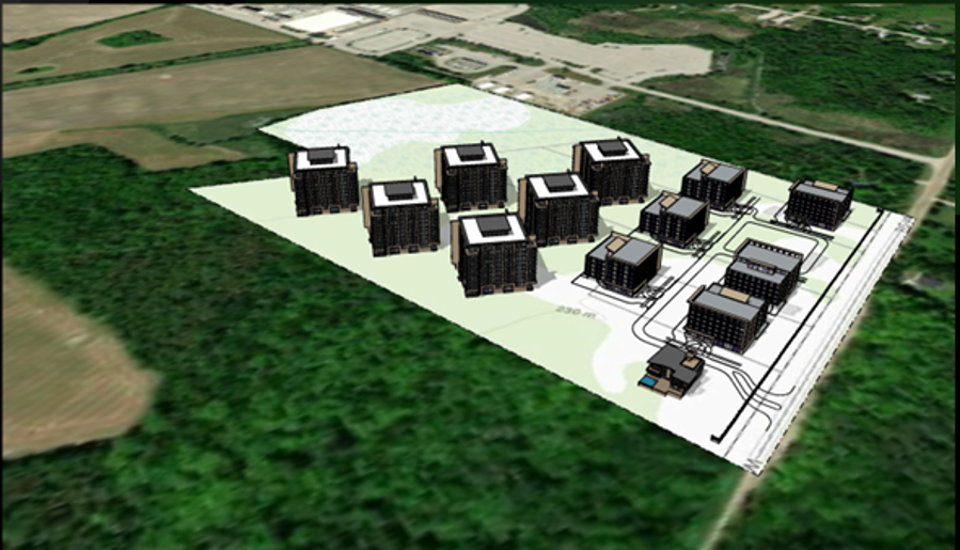Residents previously expressed concern about a potential minister’s zoning order (MZO) for a large residential development near Casino Rama, and Rama First Nation Chief Ted Williams has issued a letter outlining numerous concerns with the process.
On Jan. 16, Ramara council committee approved supporting an MZO to move forward with the project, which would include hundreds of senior and residential suites in a mix of six- and 10-storey buildings along Willison Sideroad near Rama First Nation.
MZOs are a provincial tool allowing the government to zone any property in Ontario. The property in question is currently zoned destination commercial, and the requested MZO would change it to residential.
The committee’s decision is subject to approval at Monday’s council meeting and, if it is approved, it will see the township prepare a letter to the province requesting the MZO.
In his letter to Ramara Mayor Basil Clarke, Williams outlined the harvesting and gathering rights vested in the Williams Treaties Settlement Agreement, and stated the issuance of MZOs could impinge upon the First Nation’s treaty rights.
He stated that provision of notice does not meet the province’s obligation for consultation.
“We have and continue to object to the ongoing issuance of MZOs prior to meeting the duty to consult, and attempts to characterize provision of notice and cursory information of MZO applications and approvals as being insufficient in fulfilment of the duty to consult and accommodate,” Williams stated.
“Our position is that Ontario’s duty to consult obligation on any MZO that has this potential requires in-depth consultation, a good faith effort to understand our concerns and measures to address them.”
Williams said the First Nation is willing to engage in “meaningful consultation” in a manner protecting its rights and interests, and that he hopes to see early and ongoing consultation in MZO applications.
“It is expected that consultation obligations are met prior to any site alterations on properties subject to MZOs. In this regard, the Chippewas of Rama First Nation and the Williams Treaties First Nations do recommend that they be contacted early in the municipalities planning in MZOs applications,” Williams stated.
“This will allow the parties to determine early on whether there are any concerns that might be readily addressed and remedied and in our opinion expedite the matter.”
In a statement to OrilliaMatters, Clarke said he respects Rama’s position and the township is committed to meaningful consultation with the First Nation.
“As Ramara is within the traditional and treaty territories of the Chippewas of Rama First Nation, we will continue to engage in meaningful consultation to hear, understand and address any concerns that Rama First Nation may have,” he said.
“We respect the Chippewas of Rama First Nation’s position regarding the minister’s zoning order process, and we will continue to share information throughout the process to proactively address and remedy any matters or concerns.”
Clarke made note of the province’s obligation to consult with Rama regarding the project.
“Through the MZO process, the Province of Ontario has a duty to consult with First Nations and Métis communities for decisions or actions that may adversely impact Aboriginal or treaty rights,” he said. “Based on the information received, the Province of Ontario decides to either grant or reject an MZO request.”
If approved, the project will proceed through standard planning and application processes, including environmental impact studies, a natural heritage review, servicing studies and design, and more.
In a subsequent interview with Clarke, he ensured Rama would be consulted by the township prior to requesting an MZO.
“(Williams) wants lots of consultation, and we are doing that. If we decide to ratify it, then we have a meeting set up with the First Nation prior to sending the letter. We will be consulting … not just (informing),” Clarke told OrilliaMatters.
“He said that’s where a lot of folks make mistakes: They send a letter that says this is what we’re doing. Well, that’s not consulting. That’s just information. We’re going to sit down together and have a dialogue.”
Clarke noted the land in question requires provincial rezoning, and the township has been lobbying the government since before he was mayor to change some properties’ zoning along the Rama Road corridor.
“I’m happy to say this is the first time we’ve got a provincial government that’s willing to listen and work with us, so we’re actually quite excited at the opportunity to tweak the zoning in that area,” he said. “Unfortunately, it has to be done by an MZO. There’s no other way. We can’t just change the zoning.”
Clarke said the housing developments the MZO will allow is something the township prefers to commercial developments.
“There’s a lot of issues ... within the regulations that make it very, very difficult to do anything with the area, and we’ve always wanted bigger housing components than what we wanted commercial,” he said. “That’s what this application is about. We’re taking away the commercial zoning and making it fully residential.”
